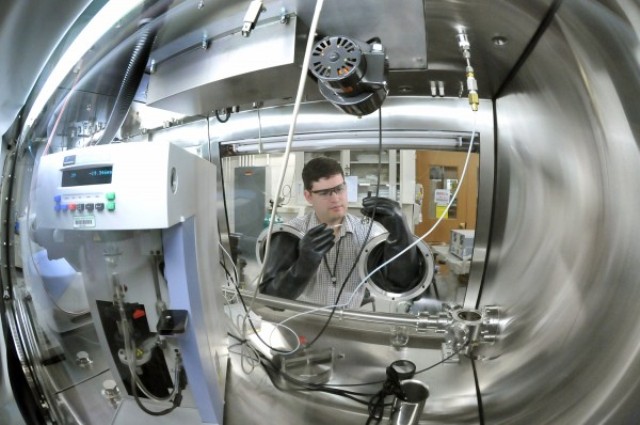Aug 14 2015
The U.S. Department of Energy’s Argonne National Laboratory and Mississippi State University (MSU) are collaborating to develop new technologies that address next-generation energy storage challenges.
 Argonne and Mississippi State University (MSU) are collaborating to develop new technologies that address next-generation energy storage challenges. The symposium, entitled Challenges and Opportunities for Advances in Grid-Tied Energy Storage in the Southeast, will explore new energy storage technologies to make the grid more resilient to natural disasters.
Argonne and Mississippi State University (MSU) are collaborating to develop new technologies that address next-generation energy storage challenges. The symposium, entitled Challenges and Opportunities for Advances in Grid-Tied Energy Storage in the Southeast, will explore new energy storage technologies to make the grid more resilient to natural disasters.
Today’s lithium-ion batteries hold more than twice the energy of those released in 1991, and they continue to improve. But even when brought to their energy storage potential, lithium-ion batteries fall short of some of our energy storage needs. Next-generation batteries are necessary to meet these needs.
This collaboration will include joint research to build next-generation batteries for the electric grid that meet the challenges caused by tornadoes, hurricanes and other weather events. New discoveries could enhance the load-balancing capabilities of the grid in the Southeast region.
Argonne has collaborated closely with MSU for many years. In addition, MSU is an affiliate of the Argonne-led Joint Center for Energy Storage Research (JCESR), a DOE Energy Innovation Hub.
A memorandum of understanding will serve as a catalyst for the establishment of the MSU-Argonne Institute for Science and Engineering, which is being created by MSU. It provides a way for researchers from Argonne to work with MSU faculty and scientists to invent breakthrough energy storage technology. The creation of the Institute will be announced today at MSU during a JCESR symposium.
“The Southeast faces some unique challenges caused by extreme weather; challenges that next-generation energy storage can address,” said Argonne Director Peter B. Littlewood. “Mississippi State University scientists and engineers are not only highly talented, but also possess a deep and necessary understanding of the region. I look forward to the gains we can make by bringing our combined resources to bear on next-generation energy challenges.”
“This new partnership with Argonne National Laboratory will showcase our world-class faculty and research capabilities, as well as provide outstanding opportunities for both undergraduate and graduate students,” said David Shaw, Mississippi State’s vice president for research and economic development.
“As Mississippi’s flagship research university, we have a very productive relationship with Argonne, and look forward to developing the next generation of energy storage technologies with this top-tier federal research lab,” Shaw explained.
Symposium Focuses on Southeastern Energy Issues
The symposium, entitled Challenges and Opportunities for Advances in Grid-Tied Energy Storage in the Southeast, will explore new energy storage technologies to make the grid more resilient to natural disasters. It will focus on the potential to use renewable resources like solar and wind power to cut costs and increase energy efficiency.
Speakers and panelists will discuss the unique needs of the Southeast region. U.S. Rep. Trent Kelly of Mississippi's 1st District will be the featured speaker at a networking luncheon during the symposium.
Argonne National Laboratory seeks solutions to pressing national problems in science and technology. The nation's first national laboratory, Argonne conducts leading-edge basic and applied scientific research in virtually every scientific discipline. Argonne researchers work closely with researchers from hundreds of companies, universities, and federal, state and municipal agencies to help them solve their specific problems, advance America's scientific leadership and prepare the nation for a better future. With employees from more than 60 nations, Argonne is managed by UChicago Argonne, LLC for the U.S. Department of Energy's Office of Science. For more, www.anl.gov. DOE’s Office of Science is the single largest supporter of basic research in the physical sciences in the United States, and is working to address some of the most pressing challenges of our time. For more information, please visit science.energy.gov.
The Joint Center for Energy Storage Research (JCESR), a DOE Energy Innovation Hub, is a major partnership that integrates researchers from many disciplines to overcome critical scientific and technical barriers and create new breakthrough energy storage technology. Led by the U.S. Department of Energy’s Argonne National Laboratory, partners include national leaders in science and engineering from academia, the private sector, and national laboratories. Their combined expertise spans the full range of the technology-development pipeline from basic research to prototype development to product engineering to market delivery.
To learn more about MSU, go to www.msstate.edu.